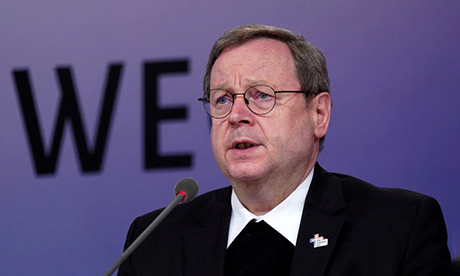Germany’s Catholic bishops have assured the Vatican that their “Synodal Path” won’t lead to a schism; however, they vowed to proceed with reforms.
Summarising the German position, the head of the German bishops’ conference, Bishop Georg Bätzing, said the German church would not make decisions that were the Vatican’s to make.
“We are Catholic,” Bätzing said at a news conference. “but we want to be Catholic in a different way.”
Bätzing’s statement comes at the close of the German bishops’ ad limina visit to Rome. During the visit, they had face time with the pope and met various Vatican departments to provide an update on local church affairs.
As part of the meetings, the 62 German bishops who participated met with various Vatican departments and had a private meeting with Pope Francis.
They also had what was described as an “open” and “frank” discussion on concerns regarding their “Synodal Path” with several Vatican department heads.
In that meeting, Vatican officials suggested issuing a “moratorium” on the Synodal Path process. However, that proposal was not accepted.
The church hierarchy in Germany and the country’s influential lay Catholic group launched the reforms after a 2018 report. They found that thousands of abuse crimes were systematically covered up by German church leaders.
Preliminary assemblies of the reform process have sought to address how power and authority are exercised in the church.
During these meetings, lay representatives and German bishops have approved calls to allow blessings for same-sex couples, married priests and the ordination of women as deacons. However, the proposals must be debated further and approved for them to be enacted.
Bätzing assured the Vatican that the German church would “not make any decisions that would only be possible in the context of the universal church,” such as changes to the church’s core doctrine.
“However, the church in Germany wants to and must provide answers to the questions being asked by the faithful,” he said.
The main lay Catholic group involved in the reforms, the Central Committee of German Catholics, said the meeting made it clear that the German church was right to pursue the dialogue in Germany because “it is not a solution to see the responsibility for the reform process solely in Rome”.
The president of the group, Irme Stetter-Karp, took issue with the joint statement issued by the Vatican and German bishops, which urged the faithful to be patient.
A “patient people of God” no longer exists, she said.
